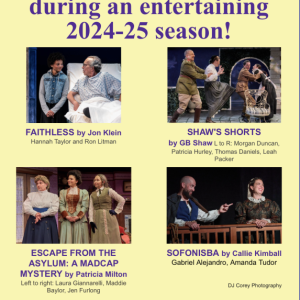
Beyond the script: Playwright Steven Dietz talks about “Bloomsday,” a love story in which past and present collide
You don’t have to read Ulysses—or, for that matter, know anything about James Joyce, its author, or Leopold Bloom, its hapless hero—to love Bloomsday.
The play, a gentle romance now blossoming in its first DC production at Washington Stage Guild, is about two young people who find each other on a walking tour of Dublin.
The two are Robbie (Josh Adams), a 20-year-old American tourist as green as they come, and Caithleen (Danielle Scott), an Irish tour guide, who is also 20, but wiser. They meet, they click, they part. Thirty-five years later, as a middle-aged Robert (Steven Carpenter) and Cait (Megan Anderson), they meet again and find out what happened.
The day, both past and present, is June 16, known as Bloomsday. Fans of Ulysses celebrate the masterpiece by following the book’s path as they walk through the city.
Although Bloomsday is the title of the show, the celebration and tour are both irrelevant to the heart of the play.
I called Steven Dietz, the accomplished author of Bloomsday, to see what he thought. I reached him in Chicago, where he was preparing for the world premiere of another play, a psychological thriller called How a Boy Falls.
“No,” he laughed, “it’s not at all about Ulysses, though the book is a convenient backdrop. The play is about Ireland, and about past and present and missed opportunity.”
Like many Americans, Dietz had never actually read Ulysses before he and his family took a trip to Ireland in 2013. He packed a digital copy of the book, and it was only while touring—in Dublin and Galway—that he dipped into the daunting masterpiece for the first time.
When he returned to the US, he reported to Seattle’s American Conservatory Theatre—who had commissioned his next play—that whatever the new play was about, it had to be set in Dublin.
“I wanted to capture the allure of Ireland, its grittiness and its wistfulness,” he said, quoting Caithleen when she explains to a sun-loving Robbie that the Irish really “prefer rainy days.”
In the play, it’s the shifting of time that propels the action. “That’s intrinsic to theater,” Dietz explained. “As playwrights, we invent time. Our characters drift back and forth between past and present and future. They exist simultaneously in different periods, some imagined and some real.”
Caithleen is particularly subject to drifting. At one point, she remarks that people “keep showing up at the wrong time,” a reference to some of her mind-bending experiences talking to Cait and Robert, neither of whom she recognizes, though both seem to know a lot about her.
While the young Caithleen, for all her inexperience, can see the turning points in life, Robbie, the young American, does not. “Eed-jit,” she calls him at one point, for failing to see what is plain to her. But he simply can’t see ahead.
That’s because Robbie, according to Dietz, is rooted in the present, while Caithleen, who is able to drift in time, sees a future that may not contain them. Similarly, it is Robert, the middle-aged, practical fellow, who thinks the future can be changed, and Cait who knows it cannot.
It’s no coincidence that the older couple is more interesting than the younger pair. “Their desires are deeper and wider. They know more. They’ve experienced the angst of loss,” Dietz said. “Yet they would not exist if not for the callowness of their previous selves.”
“Nearly all my recent plays are about loss,” he said, adding that such themes are part of age.
Now 61, Dietz has had an astonishing career and—as last week’s premiere in Chicago reveals—has no intention of slowing down. (The new play has been called “intense” and “masterful” by The Chicago Tribune.) So far, he has written or adapted about 35 plays, many of them, such as Lonely Planet, performed frequently throughout the US.
Interestingly, Steven Dietz never set out to be a writer. Instead, he started out as a director and was hired early on to work on new play development at the Playwrights Center in Minneapolis.
The playwrights whose work he directed there included some of the greatest writers of the American stage—people like August Wilson and Jon Klein—and he soon became completely immersed in their work. After six years, he received an offer to come to ACT in Seattle, which commissioned his first play. He currently divides his time between that city and Austin, Texas.
Bloomsday is not his first play to be produced in the nation’s capital… (Inventing Van Gogh, directed by Steven Carpenter, was produced at Stage Guild in 2013.)
“I think DC is extraordinary,” he said. “It’s a hotbed of new works, making it one of the most dynamic theater cities in the US…”
–Ravelle Brickman, DC Metro Theater Arts







